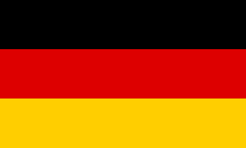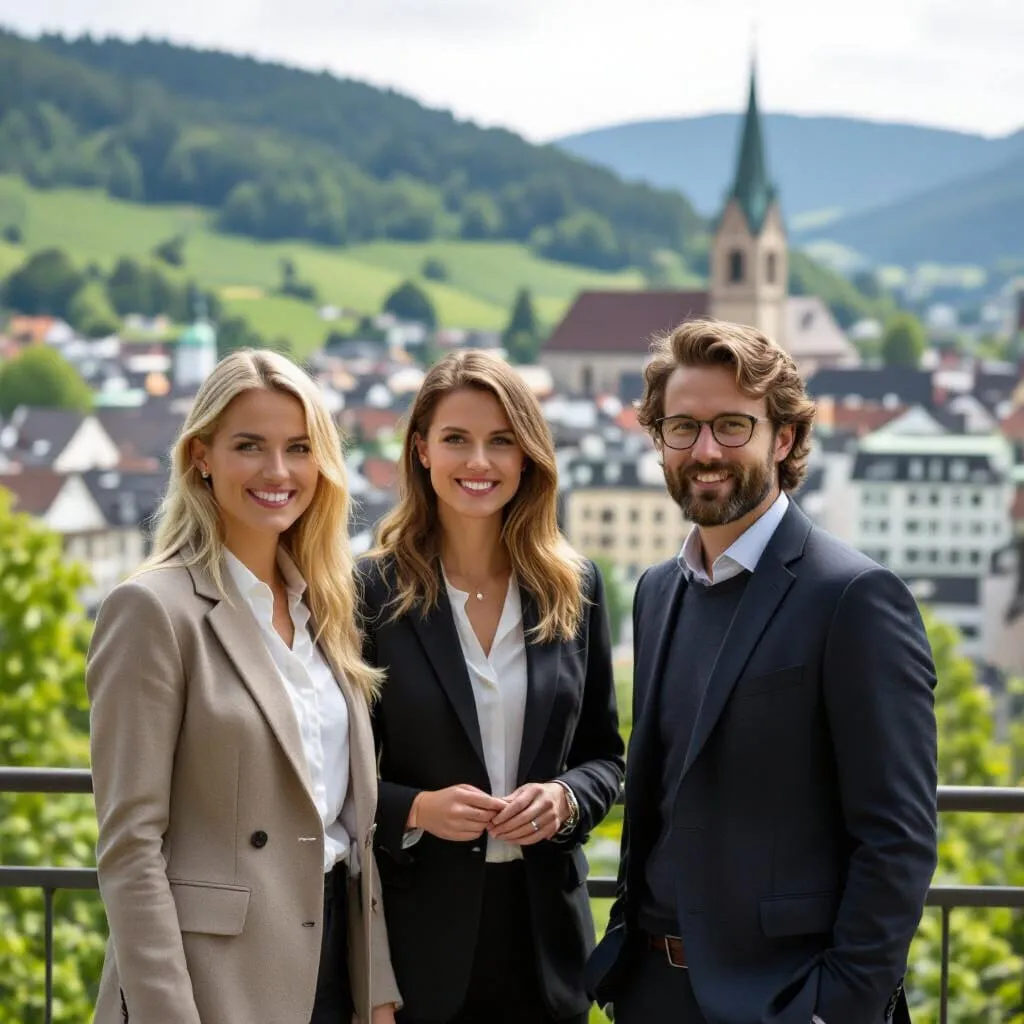The Ultimate Guide to Studying in Germany: Top 10 Universities

Introduction

Germany stands as a global powerhouse in higher education, attracting students worldwide with its world-class universities, innovative research, and the incredible advantage of low or non-existent tuition fees at its public institutions.
For aspiring engineers, scientists, and scholars, Germany offers not just a degree but a direct pathway to a thriving career in the heart of Europe's largest economy.
Its unique blend of rich academic tradition and a forward-looking focus on emerging technologies makes it an exceptionally appealing destination.
However, choosing the right university from a long list of esteemed institutions can be a daunting task.
This comprehensive guide is designed to simplify that process.
We will delve into the top universities in Germany, providing an in-depth look at their domain specializations, key accomplishments, detailed application requirements for all academic levels, insights into campus life, and much more, empowering you to make the best and most informed choice for your future academic journey.
1. Technical University of Munich (TUM)

The Technical University of Munich (TUM) is consistently ranked as one of the top universities in Germany and Europe, renowned for its excellence in research, teaching, and a strong focus on entrepreneurship.
Domain Specializations:
- Emerging Technologies: TUM excels in a variety of emerging fields. It is a leader in Artificial Intelligence and Machine Learning, with significant research conducted at the Munich School of Robotics and Machine Intelligence.
- The university is also at the forefront of Robotics, Data Science, and Quantum Technologies.
- The TUM School of Computation, Information and Technology is a hub for cutting-edge research in these areas.
- In the realm of sustainable technologies, TUM is heavily invested in research on Renewable Energy, Bioeconomy, and Sustainable Urban Development.
- Further specializations include Additive Manufacturing (3D Printing) and Cybersecurity.
- The university also focuses on Bioengineering, integrating engineering principles with life sciences to address health and environmental challenges.
- Traditional Highly Regarded Fields: TUM maintains a stellar reputation in traditional engineering and science disciplines.
- It is highly ranked globally in Mechanical Engineering, Electrical and Computer Engineering, and Aerospace Engineering.
- The university's programs in Physics, Chemistry, and Mathematics are world-class, contributing to its strong research output.
- In addition to the sciences, the TUM School of Management is triple-accredited and a leader in business education in Germany, particularly at the intersection of management and technology.
- The university also has a respected School of Medicine, with its university hospital, Rechts der Isar, being a major medical center.
- Its programs in Architecture and Civil Engineering are also highly regarded.
Overview:
- Founded in 1868 by King Ludwig II of Bavaria, TUM was established to provide the state with a center of learning dedicated to the natural sciences.
- It is a member of the prestigious TU9, an association of the nine leading technical universities in Germany, and is recognized as a "University of Excellence" under the German Universities Excellence Initiative.
- TUM fosters an entrepreneurial spirit, earning it the title of "The Entrepreneurial University." It actively supports startups and has a strong network of industry partners, including major companies like BMW, Siemens, and Audi.
- The university boasts a significant international community, with over 30% of its student body coming from abroad, creating a diverse and global learning environment.
- TUM has multiple campuses in and around Munich, including the main campus in the city center, a large research campus in Garching, and the Weihenstephan campus for life sciences. It also has a global presence with a campus in Singapore and offices in other parts of the world.
- Research is a cornerstone of TUM's identity, with numerous research centers and collaborations with institutions worldwide. It operates two research reactors and is a leading recipient of research funding.
Accomplishments:
- TUM alumni and researchers include 18 Nobel laureates and 24 Leibniz Prize winners.
- It is consistently ranked as the number one technical university in Germany and among the top universities in Europe.
- TUM holds the top position in Germany for business administration.
- In the Times Higher Education Impact Rankings 2024 for industry, innovation, and infrastructure, TUM was ranked first worldwide.
Location:
- Main Campus: Arcisstraße 21, 80333 Munich, Germany.
- Other Campuses: Garching, Freising, Straubing, Heilbronn, and Singapore.
Summary of Reviews:
- Overall Score: 4.0 stars on Studyportals, 4.1 on EDUopinions.
- Summary of Reviews: Students generally praise TUM for its high academic standards, strong research opportunities, and excellent reputation, which leads to great career prospects. The faculty is described as knowledgeable and well-versed in their fields. The university's strong industry connections are a significant advantage for internships and job placements. Some students note that the administrative processes can be slow and that the large size of the university can sometimes feel impersonal. The academic rigor requires self-discipline, and while the university provides a great environment for growth, students are expected to be proactive in their studies.
Email Address and Website:
- Email: it-support@tum.de for general inquiries and technical support. For specific departments, it's best to check the respective websites. The Student Information service can be reached at tumliving@tum.de for accommodation-related queries.
- Website: https://www.tum.de/
College Application Requirements:
- Undergraduate (UG):
- Academic Requirement: A secondary school leaving certificate equivalent to the German "Abitur." For many international students, this may require completing a one-year preparatory course (Studienkolleg) and passing the Feststellungsprüfung (FSP) exam. Indian students with a high JEE Advanced score may be exempt from the Studienkolleg. A minimum GPA of 2.0 (on the German scale) is generally expected.
- Language Proficiency: For German-taught programs, proof of German language proficiency at the DSH-2 or TestDaF 4x4 level is required.[21] For English-taught programs, an IELTS score of 6.5 or a TOEFL iBT score of 88+ is typically needed.
- Application Process: Applications are submitted through the TUMonline portal. An aptitude assessment, which may include a written test or an interview, is required for many programs.
- Documents: Required documents include academic transcripts, a letter of motivation, a CV, and for some programs, proof of internships.
- Postgraduate (PG - Master's):
- Academic Requirement: A recognized bachelor's degree in a relevant field with a minimum duration of six semesters. A strong academic record is crucial, typically equivalent to a German grade of "good" (2.5 or better).
- Standardized Tests: For some programs, especially in management and computational science, GMAT (640+) or GRE scores are required. GATE scores (90% or better) are also accepted for certain engineering programs for Indian students.
- Language Proficiency: Similar to undergraduate requirements, proof of German or English proficiency is necessary depending on the language of instruction.
- Application Process: The application is done via TUMonline. The selection process is highly competitive and often involves an aptitude assessment.
- Documents: In addition to academic transcripts and a CV, a statement of purpose, letters of recommendation, and an essay are often required.
- Doctor of Philosophy (PhD):
- Academic Requirement: An above-average master's degree or equivalent from a recognized university.
- Supervisor: The most critical step is to find a professor at TUM who is willing to supervise the doctoral research.
- Language Proficiency: While there are no formal university-wide language requirements for admission, very good English skills are essential for research and communication. Knowledge of German is advantageous for daily life.
- Application Process: After securing a supervisor, candidates must apply for entry on the doctoral candidacy list of the respective TUM school. The application is submitted through the TUM Graduate School.
- Documents: A research proposal, academic transcripts, a CV, and a supervisor agreement are key documents for the application.
Options for Part-time Jobs:
- TUM offers a variety of on-campus jobs for students, such as positions as student assistants ("HiWi") in research and teaching.
- The Munich Student Union operates a job portal that lists part-time jobs, internships, and full-time positions for students.
- Munich, as a major economic hub, offers numerous "Werkstudent" (working student) opportunities in companies, particularly for students in IT and engineering fields. These positions are often related to the student's field of study.
- International students from outside the EU/EEA are generally allowed to work up to 120 full days or 240 half days per year.
Additional Details:
- Tuition Fees: As a public university in Bavaria, TUM does not charge tuition fees for most of its programs for both domestic and international students. However, there is a mandatory semester fee that covers student services and a public transportation ticket.
- Living Costs: Munich is known for its high quality of life but also for its high cost of living, particularly for accommodation. Students should budget accordingly.
- Student Life: TUM has a vibrant student life with numerous clubs, sports facilities, and cultural events. The location in Munich offers a rich cultural landscape and proximity to the Alps for outdoor activities.
- Accommodation: Finding accommodation in Munich can be challenging. TUM provides support through its own housing exchange and offers advice, but students are encouraged to start their search early.
2. Ludwig Maximilian University of Munich (LMU)

Ludwig Maximilian University of Munich, commonly known as LMU, is one of Germany's oldest and most prestigious public research universities. As a "University of Excellence," it is recognized globally for its outstanding teaching and research across a broad spectrum of disciplines, from the humanities and social sciences to natural sciences and medicine.
Domain Specializations:
- Emerging Technologies: While traditionally known for its strengths in the humanities and natural sciences, LMU is increasingly making its mark in emerging technological fields.
- It has a strong focus on Life Sciences and Biotechnology, particularly in areas like Neurosciences, Genetics, and Synthetic Biology.
- The university is also developing its expertise in Data Science and Computational Sciences, applying these to various disciplines including physics, linguistics, and social sciences.
- Furthermore, LMU is active in Nanoscience and Quantum Optics, with research centers dedicated to exploring the fundamental principles and applications of these fields.
- Traditional Highly Regarded Fields: LMU's reputation is firmly built on its traditional strengths.
- It is world-renowned for its programs in Physics, with notable research in astrophysics, biophysics, and particle physics.
- The university's Faculty of Medicine is one of the largest and most respected in Germany, with extensive clinical and research facilities. LMU holds a top-tier international ranking in the Humanities, including Philosophy, History, and Classical Studies.
- It also excels in Law, Economics, and Business Administration.
- The fields of Psychology and Veterinary Medicine at LMU are also considered among the best in the country and worldwide.
Overview:
- Founded in 1472 in Ingolstadt, LMU was moved to Landshut in 1800 before finally settling in Munich in 1826.
- It is one of Germany's largest universities, with a diverse student body of over 50,000 students, including a significant proportion of international students (around 17%).
- LMU is part of the German U15, an association of large, research-intensive German universities, and is a founding member of the League of European Research Universities (LERU).
- The university's main campus is located in the heart of Munich, in the vibrant district of Maxvorstadt, surrounded by museums, libraries, and cultural institutions.
- LMU's research-oriented teaching philosophy encourages students to engage with current research from the very beginning of their studies.
- It has a vast network of international partnerships, offering numerous opportunities for student and staff exchange programs across the globe.
Accomplishments:
- LMU is associated with 43 Nobel laureates, including Wilhelm Conrad Röntgen, Max Planck, and Werner Heisenberg, giving it one of the highest counts of Nobel laureates for any university worldwide.
- It is consistently ranked among the top universities in Germany and within the top 100 globally in major international rankings like THE, QS, and ARWU.
- LMU has been continuously funded under the German Universities Excellence Initiative since 2006, a testament to its leading-edge research and institutional strategy.
Location:
- Main Campus: Geschwister-Scholl-Platz 1, 80539 Munich, Germany.
- Other Campuses: The university's faculties and facilities are spread throughout Munich, including the HighTechCampus in Grosshadern-Martinsried, which hosts many of the natural and life sciences departments.
Online Rating and Summary of Reviews:
- Overall Score: 4.1 stars on Studyportals, 4.2 on EDUopinions.
- Summary of Reviews: Students frequently commend LMU for its academic excellence, the high quality of its professors, and its central location in a lively city. The breadth of subjects offered is a significant plus. The libraries and research facilities are considered top-notch. On the downside, some students find the administration to be bureaucratic and slow. The large class sizes in some popular programs can make it difficult to have close contact with professors. The high cost of living and the competitive housing market in Munich are common challenges mentioned by students.
Email Address and Website:
- Email: Use the central contact form on the website for general inquiries. The International Office can be reached for specific questions related to international students.
- Website: https://www.lmu.de/en/
College Application Requirements:
- Undergraduate (UG):
- Academic Requirement: A university entrance qualification (Hochschulzugangsberechtigung), such as the German Abitur. International applicants often need to have their secondary school certificates evaluated. If the certificate is not deemed equivalent, they must attend a Studienkolleg (preparatory college) and pass the Feststellungsprüfung (FSP) exam.
- Language Proficiency: For courses taught in German, proficiency at the DSH-2 or TestDaF (TDN 4 in all sections) level is required. For the few English-taught bachelor's programs, proof of English proficiency (e.g., TOEFL, IELTS) is necessary.
- Application Process: For most programs, international students from non-EU countries apply directly to the International Office of LMU. Students from EU/EEA countries often apply through the national admissions portal, Hochschulstart.de, or directly to the university depending on the subject. Many subjects have local admission restrictions (NC - Numerus Clausus).
- Documents: Officially certified copies of school leaving certificates and transcripts, language proficiency certificates, a CV, and for some programs, a letter of motivation.
- Postgraduate (PG - Master's):
- Academic Requirement: A bachelor's degree in a relevant field from a recognized university with excellent grades. Specific ECTS credit requirements in certain subject areas are common.
- Language Proficiency: Proof of language proficiency in either German or English, depending on the program's language of instruction.
- Application Process: Applications are typically submitted directly to the respective department or faculty. The process is competitive and often involves an aptitude assessment, which can include an evaluation of documents, a written test, or an interview.
- Documents: Bachelor's degree certificate and transcript of records, CV, letter of motivation, letters of recommendation (for some programs), and language certificates.
- Doctor of Philosophy (PhD):
- Academic Requirement: A very good master's degree from a recognized university.
- Supervisor: The primary requirement is finding a professor at LMU who agrees to be the supervisor for the doctoral project.
- Application Process: There are two main paths: individual doctorates, where the candidate works independently under a supervisor, or structured PhD programs offered by Graduate Schools. For individual doctorates, once a supervisor is secured, the candidate must apply for admission to the relevant faculty.
- Documents: A detailed research proposal, master's degree certificate, academic transcripts, CV, and a written confirmation of supervision from an LMU professor.
Options for Part-time Jobs:
- Munich's strong economy provides ample part-time job opportunities for students in various sectors, including retail, hospitality, and administration.
- LMU's "Student und Arbeitsmarkt" (Student and Job Market) career service provides job listings and advice.
- "Werkstudent" (working student) positions in companies related to a student's field of study are highly sought after and offer valuable professional experience.
- On-campus jobs as student assistants (HiWis) in libraries, departments, or research projects are also available.
- Non-EU/EEA students are permitted to work for 120 full days or 240 half days per year.
Additional Details:
- Tuition Fees: LMU Munich does not charge tuition fees for the vast majority of its programs. A mandatory semester fee is required, which includes a contribution to the student union and a public transport semester ticket.
- Living Costs: Munich is one of the most expensive cities in Germany. Students should budget approximately €900-€1,200 per month, with the largest expense being accommodation.
- Student Life: LMU offers a rich student life with access to university sports (ZHS), music ensembles, theater groups, and over 100 student societies. Its location provides easy access to Munich's cultural offerings and the natural beauty of Bavaria.
- Accommodation: The Munich Student Union (Studierendenwerk München) manages numerous student residences, but waiting lists are very long. Students should start looking for private accommodation well in advance.
3. Heidelberg University (Ruprecht-Karls-Universität Heidelberg)

Heidelberg University, founded in 1386, is Germany's oldest university and a leading global research institution. It is a state university and a founding member of the League of European Research Universities (LERU) and the Coimbra Group. The university is renowned for its research-based teaching and its strong emphasis on interdisciplinary collaboration, particularly in the humanities, life sciences, and medicine.
Domain Specializations:
- Emerging Technologies: Heidelberg University is a powerhouse in the life sciences and is making significant strides in emerging technologies linked to this field.
- It is a leader in Medical Physics, Biotechnology, and Molecular Engineering.
- The university's BioQuant center focuses on the quantitative analysis of molecular and cellular biosystems.
- Heidelberg is also at the forefront of Computational Linguistics and Digital Humanities, applying computational methods to analyze text and cultural data.
- Research in Scientific Computing is another key area, with applications spanning from astrophysics to molecular biology.
- Traditional Highly Regarded Fields: The university has a long-standing and formidable reputation in several traditional fields.
- It is consistently ranked among the world's best for Medicine and Life Sciences, benefiting from its close collaboration with the German Cancer Research Center (DKFZ) and the Heidelberg University Hospital.
- It holds a preeminent position in Physics and Astronomy, with several affiliated Nobel laureates.
- The faculties of Law, Theology, and Classical Studies are among the oldest and most respected in Germany.
- Heidelberg also excels in Chemistry, History, and Archaeology.
Overview:
- As Germany's oldest university, it has a rich history of intellectual and scientific discovery, shaping European thought for over six centuries.
- It operates under the motto "Semper Apertus" (Always Open), reflecting its commitment to open-mindedness and tolerance.
- The university is structured into 12 faculties and offers a comprehensive range of subjects at undergraduate, graduate, and postdoctoral levels.
- Heidelberg is a "University of Excellence," a distinction awarded for its outstanding research performance and institutional strategy.
- The university is spread across two main locations: the Old Town campus for humanities and social sciences, and the Neuenheimer Feld campus on the outskirts of the city for natural sciences, life sciences, and medicine.
- It fosters a highly international environment, attracting students and researchers from over 130 countries.
Accomplishments:
- Heidelberg University is associated with 57 Nobel laureates, many of whom studied, taught, or conducted research at the university.
- It consistently features in the top 3 universities in Germany and among the top 100 universities worldwide in all major international rankings.
- The university hosts numerous internationally recognized research centers and is a key player in several major collaborative research initiatives funded by the German Research Foundation (DFG).
Location:
- Main Address (Old Town): Grabengasse 1, 69117 Heidelberg, Germany.
- Neuenheimer Feld Campus: Im Neuenheimer Feld, 69120 Heidelberg, Germany.
Online Rating and Summary of Reviews:
- Overall Score: 4.1 stars on Studyportals, 4.3 on EDUopinions.
- Summary of Reviews: Students praise the university for its high academic standards, beautiful and historic campus environment, and the quality of its research facilities. The small city of Heidelberg is described as charming and student-friendly. The strong interdisciplinary approach, especially in the sciences, is highly valued. Some criticisms include the difficulty of finding affordable accommodation and the perception that the administration can be somewhat rigid. While the city is beautiful, some students from larger metropolitan areas find it a bit quiet.
Email Address and Website:
- Email: The central email is info@uni-heidelberg.de. The International Relations Office has specific contact details on the university website.
- Website: https://www.uni-heidelberg.de/en
College Application Requirements:
- Undergraduate (UG):
- Academic Requirement: A recognized university entrance qualification (e.g., German Abitur). International applicants must have their school-leaving certificates checked for equivalency. Attending a preparatory course (Studienkolleg) may be required.
- Language Proficiency: For German-taught programs, a DSH-2 or TestDaF 4x4 certificate is mandatory. For English-taught programs, proof of English proficiency (e.g., IELTS 6.5+, TOEFL 90+) is needed.
- Application Process: Applications for most undergraduate programs are submitted directly to the university via its online portal. Many programs have admission restrictions (Numerus Clausus).
- Documents: Certified copies of academic transcripts and their translations, language proficiency proof, CV, and for some programs, a specific questionnaire or letter of motivation.
- Postgraduate (PG - Master's):
- Academic Requirement: An above-average bachelor's degree in a related field. Specific course prerequisites are often listed for each master's program.
- Language Proficiency: German or English language proficiency, as required by the specific program.
- Application Process: Applications are made directly to the university. The selection process is highly competitive and is based on academic merit, the relevance of the bachelor's degree, and sometimes an interview or a written test.
- Documents: University degree certificate, transcript of records, a detailed description of the bachelor's program modules, letter of motivation, CV, and language certificates.
- Doctor of Philosophy (PhD):
- Academic Requirement: A qualified master's degree with excellent grades.
- Supervisor: The most important step is to find a professor at one of the faculties who is willing to supervise the doctoral research thesis.
- Application Process: After finding a supervisor, the candidate must apply for acceptance as a doctoral student at the respective faculty. Alternatively, candidates can apply for admission to one of the structured graduate schools.
- Documents: An exposé or research proposal, certified copies of university degrees, a statement from the supervisor, and a CV.
Options for Part-time Jobs:
- Heidelberg is a major hub for science and research, offering many "HiWi" (student assistant) positions at the university, the university hospital, and affiliated research institutes like the DKFZ and Max Planck Institutes.
- The city's tourism industry provides part-time jobs in hospitality and retail.
- The Studierendenwerk Heidelberg offers a job portal for students.
- Major companies in the Rhine-Neckar metropolitan region (e.g., SAP, BASF) also offer working student positions, though this may require commuting.
- The 120/240-day work rule applies to non-EU/EEA students.
Additional Details:
- Tuition Fees: Heidelberg University, being in the state of Baden-Württemberg, charges tuition fees for international students from non-EU/EEA countries. The fee is currently €1,500 per semester. A reduced fee of €650 per semester applies for students pursuing a second degree. There is also a mandatory semester contribution for all students.
- Living Costs: Living costs in Heidelberg are moderate compared to cities like Munich, but finding accommodation can be difficult. A monthly budget of €800-€1,000 is recommended.
- Student Life: Heidelberg offers a unique student experience in a historic and picturesque setting. There is a wide range of university sports, student clubs, and cultural activities. The city is known for its vibrant, international atmosphere.
- Accommodation: The Studierendenwerk manages student dormitories, but demand far exceeds supply. It is crucial to apply early and also search the private market.
4. Charité - Universitätsmedizin Berlin

As the joint medical faculty of the Freie Universität Berlin and the Humboldt-Universität zu Berlin, Charité is one of the largest and most research-intensive university hospitals in Europe. It is renowned globally for its exceptional medical care, groundbreaking research, and innovative medical and dental education.
Domain Specializations:
- Emerging Technologies: Charité is at the cutting edge of medical technology and biomedical research.
- It is a leader in Personalized Medicine, utilizing genomic data to tailor treatments to individual patients.
- The institution is heavily invested in Digital Health, developing and implementing e-health solutions, telemedicine, and AI-driven diagnostic tools.
- Other key areas include Regenerative Medicine, with a focus on stem cell therapies and tissue engineering, and Advanced Medical Imaging, employing novel techniques for diagnostics and research.
- The Berlin Institute of Health at Charité (BIH) is dedicated to translational research, bridging the gap between basic science and clinical application.
- Traditional Highly Regarded Fields: Charité's reputation is built on its excellence across the entire spectrum of medicine.
- It is world-renowned for its expertise in Cardiology, Oncology, and Neurology.
- The German Heart Center Berlin and the German Rheumatism Research Center are affiliated with Charité, underscoring its leading role in these fields.
- Other areas of exceptional strength include Immunology, Infectious Diseases, and Transplant Medicine.
- The university hospital provides top-tier education and training for future physicians and dentists, integrating clinical practice with rigorous scientific research from the very start.
Overview:
- Charité's history dates back to 1710 when it was founded as a plague hospital outside Berlin's city walls.
- It is one of Germany's most famous medical institutions, having been the workplace of more than half of all German Nobel laureates in Physiology or Medicine, including Emil von Behring and Robert Koch.
- Today, Charité is a massive enterprise with approximately 100 different departments and institutes, spread across four campuses in Berlin.
- It is a major employer in Berlin, with a highly diverse and international staff of researchers, clinicians, and students.
- The institution's philosophy is centered on the tight integration of patient care, research, and teaching, ensuring that the latest scientific findings are quickly translated into clinical practice.
- Charité plays a central role in Berlin's health and science landscape, collaborating closely with numerous research institutions like the Max Planck Institute and the Helmholtz Association.
Accomplishments:
- Associated with a remarkable number of Nobel Prize winners in Physiology or Medicine, including Robert Koch (tuberculosis), Emil von Behring (diphtheria antitoxin), and Paul Ehrlich (immunology).
- Consistently ranked as the best hospital in Germany and among the top hospitals worldwide.
- Leads numerous large-scale national and international research consortia and is a major recipient of competitive third-party funding.
- Played a crucial role in global health crises, including the development of the first PCR test for SARS-CoV-2 by a Charité virologist.
Location:
- Four main campuses: Campus Benjamin Franklin (CBF) in Steglitz, Campus Charité Mitte (CCM) in Mitte, Campus Virchow-Klinikum (CVK) in Wedding, and Campus Berlin Buch (CBB) in Buch.
- Central Address: Charitéplatz 1, 10117 Berlin, Germany.
Online Rating and Summary of Reviews:
- Overall Score: 4.4 stars on Studyportals (for its specific degree programs).
- Summary of Reviews: Students and researchers praise Charité for its unparalleled research opportunities, access to state-of-the-art facilities, and the opportunity to learn from world-leading experts. The clinical exposure is considered exceptional. The environment is described as highly demanding, competitive, and fast-paced. Administrative processes can be complex due to the institution's vast size. The international atmosphere and the location in the dynamic city of Berlin are frequently highlighted as major advantages.
Email Address and Website:
- Email: Use the central contact forms on the website as there is no single general email address. Specific international offices have dedicated contact details.
- Website: https://www.charite.de/en/
College Application Requirements:
- Undergraduate (UG - State Examination in Medicine/Dentistry):
- Academic Requirement: An excellent secondary school leaving certificate equivalent to the German Abitur. Admission is extremely competitive and primarily based on the final grade (Numerus Clausus - NC). International students from non-EU countries apply via Uni-assist.
- Language Proficiency: A very high level of German proficiency is mandatory. Applicants must provide proof of DSH-3 or TestDaF with the highest grade (TDN 5) in all sections.
- Application Process: Admission is centrally regulated. EU students apply through the national Hochschulstart.de platform. Non-EU students apply through Uni-assist. Additional selection criteria may include the Test for Medical Studies (TMS) and relevant vocational training or experience.
- Documents: Officially certified copies of school leaving certificate, language certificate, and for some, results of the TMS.
- Postgraduate (PG - Master's):
- Academic Requirement: A very good bachelor's degree in a relevant life science or health science field (e.g., biology, biochemistry, public health).
- Language Proficiency: The language of instruction for most master's programs is English. A high level of English proficiency is required (e.g., IELTS 6.5-7.0, TOEFL 95+).
- Application Process: Applications are submitted directly through the Charité's online application portal. The selection is highly competitive and includes a review of academic records, a letter of motivation, and often an interview.
- Documents: Bachelor's degree certificate and transcript, letter of motivation, letters of recommendation, CV, and proof of English proficiency.
- Doctor of Philosophy (PhD) / Dr. med. / Dr. rer. medic.:
- Academic Requirement: An excellent master's degree (for PhD/Dr. rer. medic.) or a completed medical/dental degree (for Dr. med.).
- Supervisor: Candidates must independently find a supervisor (Professor or "Privatdozent") within a Charité department or institute who has an open position and is willing to supervise the project.
- Application Process: After securing a supervisor and a project, candidates apply to one of the structured doctoral programs or follow the individual doctorate path. The application is typically made through the Charité's doctoral office ("Promotionsbüro").
- Documents: University degree certificates, a signed supervision agreement, a project outline, and a CV.
Options for Part-time Jobs:
- Many students work as student assistants ("HiWis") within Charité's numerous research labs and administrative departments.
- Medical students can take on nursing assistant jobs ("Sitzwache" or "Pflegehelfer") within the hospital, which provides valuable clinical experience.
- Berlin's large and diverse economy offers a vast number of part-time jobs in hospitality, retail, startups, and services.
- The 120/240-day work regulation applies to non-EU/EEA students.
Additional Details:
- Tuition Fees: Charité does not charge tuition fees for its undergraduate medical studies or for most of its master's and doctoral programs. All students must pay a semester contribution which includes the public transportation ticket for Berlin. Some specific executive master's programs may have tuition fees.
- Living Costs: Berlin is more affordable than cities like Munich or Heidelberg, but costs are rising. A student should budget around €850-€1,100 per month.
- Student Life: As a student at Charité, you are also enrolled at either FU or HU Berlin, giving you access to the extensive student life, sports facilities, and cultural activities of these large universities. Berlin itself offers an unparalleled cultural and social scene.
- Accommodation: The Studierendenwerk Berlin manages student dormitories, but waiting lists are long. The housing market in Berlin is very competitive, so starting the search early is essential.
5. Humboldt University of Berlin (HU Berlin)

Founded in 1810 by Wilhelm von Humboldt, the Humboldt University of Berlin is one of Berlin's oldest universities and a globally recognized institution for excellence in the humanities and sciences. Its founding principle of unifying research and teaching has become the model for many modern research universities worldwide.
Domain Specializations:
- Emerging Technologies: While renowned for its humanities, HU Berlin has a strong and growing presence in emerging technologies, particularly at its Adlershof campus, Germany's leading science and technology park.
- It excels in Photonics and Optics, with cutting-edge research in laser technology and optical materials.
- The university is also a key player in Materials Science, focusing on the development of novel materials for electronics and energy applications.
- In the field of life sciences, it has a focus on Molecular Biology and Genetics.
- Furthermore, HU Berlin is developing its expertise in Data Science and Climate Change Research through its Integrative Research Institutes.
- Traditional Highly Regarded Fields: HU Berlin's historical strength lies in the Humanities and Social Sciences.
- It is considered one of the world's leading universities for Philosophy, History, Linguistics, and Social Sciences.
- The university's Law and Economics faculties are also among the most prestigious in Germany. In the natural sciences, it holds a strong reputation in Physics, Mathematics, and Chemistry.
- Through its partnership in Charité, it is also a top institution for Medicine.
Overview:
- HU Berlin's founding model, emphasizing academic freedom and the integration of research and study, was revolutionary and influenced universities from the US to Japan.
- It is located in the heart of Berlin, with its main building on the famous Unter den Linden boulevard.
- The university is a "University of Excellence," recognized for its top-level research and strategic institutional concepts.
- HU Berlin is home to a diverse student body, with a significant percentage of international students contributing to its cosmopolitan atmosphere.
- The university is structured into nine faculties, covering a broad spectrum of subjects, and several central and interdisciplinary institutes.
- Its Adlershof campus is a prime example of a successful synergy between university research, non-university research institutions, and technology-oriented companies.
Accomplishments:
- The university is associated with 57 Nobel laureates, including Albert Einstein, Max Planck, and Fritz Haber.
- Thinkers like Georg Wilhelm Friedrich Hegel, Karl Marx, and the Brothers Grimm taught or studied at HU Berlin, making it a cradle of modern thought.
- It consistently ranks among the top universities in Germany and the top 150 worldwide.
- Leads several Clusters of Excellence under the German Excellence Strategy, including "Matters of Activity: Image Space Material" and "Science of Intelligence" (with TU Berlin).
Location:
- Main Campus (Mitte): Unter den Linden 6, 10117 Berlin, Germany.
- Adlershof Campus (Natural Sciences): Rudower Chaussee, 12489 Berlin, Germany.
- Nord Campus (Life Sciences): Philippstraße/Hannoversche Straße, 10115 Berlin, Germany.
Online Rating and Summary of Reviews:
- Overall Score: 4.1 stars on Studyportals, 4.1 on EDUopinions.
- Summary of Reviews: Students value the university's prestigious reputation, the high quality of teaching, especially in the humanities, and the intellectual atmosphere. The central location in Berlin is seen as a major benefit. The library system, particularly the "Jacob-und-Wilhelm-Grimm-Zentrum," is highly praised. Some criticisms point to bureaucracy in administration and occasional overcrowding in popular courses. The separation of campuses can be inconvenient for students taking interdisciplinary courses.
Email Address and Website:
- Email: Use the central contact form at [hu.berlin/contact] or find specific departmental contacts on the website. The International Office is the primary contact for prospective international students.
- Website: https://www.hu-berlin.de/en
College Application Requirements:
- Undergraduate (UG):
- Academic Requirement: A secondary school leaving certificate recognized as equivalent to the German Abitur. Many international applicants will need to apply via Uni-assist for a preliminary review documentation (VPD). If the qualification is not equivalent, a Studienkolleg must be completed.
- Language Proficiency: For German-taught programs, DSH-2 or TestDaF 4x4 is required. For the few English-taught programs, proof of English proficiency (e.g., C1 level) is necessary.
- Application Process: Applications for programs with restricted admission (NC) are made directly to the university (for internationals) or via Hochschulstart.de (for EU nationals). Applications for open-admission programs are also submitted directly online.
- Documents: Certified copies of academic records, language certificates, CV, and for some courses, a letter of motivation.
- Postgraduate (PG - Master's):
- Academic Requirement: A good bachelor's degree in a relevant subject area. Specific credit requirements in particular fields of the bachelor's program are common.
- Language Proficiency: Proof of German or English proficiency according to the language of instruction of the chosen master's program.
- Application Process: Applications are submitted through the HU Berlin online portal. The selection process is merit-based and can be very competitive.
- Documents: Bachelor's degree certificate and transcript, module descriptions from the bachelor's program, CV, letter of motivation, and language certificates.
- Doctor of Philosophy (PhD):
- Academic Requirement: An above-average master's degree.
- Supervisor: Candidates must first find a professor at HU Berlin willing to supervise their doctoral thesis.
- Application Process: Once a supervisor is confirmed, the applicant must apply for admission to the doctoral studies office of the relevant faculty. Alternatively, one can apply to a structured PhD program at one of the Humboldt Graduate Schools.
- Documents: University degree certificates, a signed supervision agreement, a detailed research proposal, and a CV.
Options for Part-time Jobs:
- HU Berlin offers numerous on-campus jobs as student tutors or assistants (HiWis).
- Being in the capital city, students have access to a vast job market, including opportunities in government institutions, NGOs, cultural institutions, and a thriving startup scene.
- Many embassies and international organizations in Berlin offer internships and part-time jobs, which are particularly attractive to students of social sciences and humanities.
- The 120/240-day work rule for non-EU/EEA students is applicable.
Additional Details:
- Tuition Fees: HU Berlin does not charge tuition fees. A semester contribution must be paid by all students, which covers administrative costs and the Berlin public transport ticket.
- Living Costs: A budget of €850-€1,100 per month is recommended to cover rent, food, health insurance, and other expenses in Berlin.
- Student Life: Students have access to a wide range of activities, including over 100 sports offered by the university sports center, choirs, orchestras, theaters, and numerous student initiatives. The city of Berlin provides an endlessly stimulating environment.
- Accommodation: The Studierendenwerk Berlin provides student housing, but demand is extremely high. It is advisable to apply for a room as soon as possible and simultaneously search the private market.
6. Free University of Berlin (FU Berlin)

The Free University of Berlin was founded in 1948 by students and professors in West Berlin, with the support of the American allied forces, as a bastion of academic freedom in contrast to the communist-controlled Humboldt University in East Berlin. Today, it is one of Germany's leading research universities, particularly renowned for its strength in the social sciences, humanities, and area studies.Domain Specializations:
- Emerging Technologies: FU Berlin has established strong research clusters in the life sciences and natural sciences.
- It excels in Biochemistry and Molecular Biology, with a focus on understanding complex biological systems.
- The university is a leader in Geosciences, particularly in research related to climate change and Earth systems.
- In the field of computer science, it has a notable focus on Bioinformatics and Artificial Intelligence.
- The Dahlem Center for Complex Quantum Systems is a hub for research in Quantum Physics.
- Traditional Highly Regarded Fields:
- FU Berlin's international reputation is particularly strong in the Political and Social Sciences.
- It is considered one of the best institutions in Europe for Political Science, International Relations, and Area Studies (e.g., North American, Latin American, and East European Studies).
- It also has highly respected programs in the Humanities, including History, Media and Communication Studies, and Archaeology.
- The university's departments of Physics, Chemistry, and Pharmacy are also held in high esteem.
- Through its involvement in Charité, it is also a top institution for Medicine.
Overview:
- The name "Free University" reflects its founding history and commitment to the principles of freedom in research and teaching.
- It is one of the eleven German universities to have been awarded the title of "University of Excellence" in all three funding lines of the German Excellence Initiative.
- The main campus is located in the leafy, residential district of Dahlem in southwestern Berlin, creating a unique campus-like atmosphere.
- FU Berlin maintains an extensive global network of partnerships with top universities, facilitating a wide range of student and researcher exchange programs.
- It is a large and comprehensive university with 12 departments and three central institutes, offering over 150 different academic programs.
- The university places a strong emphasis on interdisciplinarity and has several interdisciplinary research centers focusing on topics like freedom, environmental research, and historical anthropology.
Accomplishments:
- The university is associated with 5 Nobel laureates and 18 Leibniz Prize winners.
- It consistently ranks among the top ten universities in Germany and is highly ranked internationally, especially in the arts, humanities, and social sciences.
- FU Berlin successfully leads several "Clusters of Excellence," including "Contestations of the Liberal Script (SCRIPTS)" and "NeuroCure: New Perspectives in the Treatment of Neurological Diseases."
Location:
- Main Campus (Dahlem): Kaiserswerther Straße 16-18, 14195 Berlin, Germany.
- Other locations: The university also has facilities in other parts of Berlin, including the Geocampus in Lankwitz.
Online Rating and Summary of Reviews:
- Overall Score: 4.1 stars on Studyportals, 4.0 on EDUopinions.
- Summary of Reviews: Students appreciate the green and spacious campus in Dahlem, which provides a pleasant study environment. The quality of teaching, particularly in political science and area studies, is rated very highly. The university's strong international focus and exchange opportunities are a major draw. Some students find the Dahlem campus to be somewhat removed from the central buzz of Berlin. As with other large public universities, navigating the administration can sometimes be challenging.
Email Address and Website:
- Email: The central email is info-service@fu-berlin.de. For admissions, the relevant offices have specific contact details on the website.
- Website: https://www.fu-berlin.de/en/
College Application Requirements:
- Undergraduate (UG):
- Academic Requirement: A qualified secondary school leaving certificate (Hochschulzugangsberechtigung). International applicants from non-EU countries must apply via Uni-assist to have their qualifications checked.
- Language Proficiency: For German-taught courses, DSH-2 or TestDaF 4x4 is required. For English-taught bachelors, proof of C1-level English is needed.
- Application Process: The application process depends on the applicant's nationality and the chosen subject. EU citizens often apply through Hochschulstart.de for NC subjects, while non-EU citizens apply through Uni-assist.
- Documents: Certified copies of school certificates and transcripts (with translations), proof of language proficiency, and a CV.
- Postgraduate (PG - Master's):
- Academic Requirement: A bachelor's degree in a related field from a recognized university. A minimum number of credits in specific areas of study is often required.
- Language Proficiency: German or English language skills, depending on the master's program.
- Application Process: Applications are typically submitted through the Uni-assist portal for non-EU applicants and directly to the university for EU applicants. Selection is based on the final grade of the bachelor's degree and the relevance of the previous studies.
- Documents: University degree certificate and transcript of records, language certificates, CV, and for some programs, a letter of motivation or writing sample.
- Doctor of Philosophy (PhD):
- Academic Requirement: An excellent master's degree.
- Supervisor: Aspiring doctoral candidates must independently find a professor at FU Berlin to supervise their research.
- Application Process: After finding a supervisor, candidates must apply for admission to the doctoral board of the relevant department. An alternative is to apply for a position in a structured PhD program at the Dahlem Research School.
- Documents: Certified copies of university degrees, a research proposal, a statement of support from the supervisor, and a CV.
Options for Part-time Jobs:
- FU Berlin and its affiliated research centers offer many student assistant (HiWi) jobs.
- The university's Career Service provides resources and listings for internships and part-time jobs.
- Berlin's diverse job market offers ample opportunities, particularly in the service sector, tourism, and for students with language skills, in international companies and organizations.
- The standard 120/240-day work rule for non-EU/EEA students applies.
Additional Details:
- Tuition Fees: FU Berlin is a public university and does not charge tuition fees for its programs, with the exception of a few continuing education master's programs. A semester fee covering student services and a public transport ticket is mandatory for all students.
- Living Costs: Monthly living expenses in Berlin for a student are estimated to be between €850 and €1,100.
- Student Life: The university has a very active student life with a wide range of political, social, and cultural groups. The university sports center offers a huge variety of courses, and the location in Berlin provides endless opportunities for recreation and entertainment.
- Accommodation: Student housing is managed by the Studierendenwerk Berlin. Due to high demand, it is crucial to apply early. Many students live in shared private apartments ("Wohngemeinschaften" or WGs) across the city.
7. Karlsruhe Institute of Technology (KIT)

The Karlsruhe Institute of Technology (KIT) is a unique institution in Germany, created in 2009 through the merger of the University of Karlsruhe (founded in 1825), a research university, and the Karlsruhe Research Center, a national research center of the Helmholtz Association. This structure gives it a distinctive profile with a strong focus on research, teaching, and innovation in engineering and the natural sciences.
Domain Specializations:
- Emerging Technologies: KIT is a powerhouse in technology and engineering.
- It is a leader in Energy Technologies, with extensive research on renewable energies, energy storage systems, and nuclear safety.
- The institute has a strong focus on Information Technology and Computer Science, with specializations in Artificial Intelligence, Robotics, and IT Security.
- KIT is also at the forefront of Nanoscience and Materials Science, developing new materials for a wide range of applications.
- Another key area is Mobility Systems, where research focuses on autonomous driving, electric vehicles, and intelligent traffic systems.
- Traditional Highly Regarded Fields: KIT has a long and distinguished history in traditional engineering disciplines.
- It is consistently ranked as one of the best universities in Germany and the world for Mechanical Engineering, Electrical Engineering, and Civil Engineering.
- Its programs in Computer Science (Informatik) are also top-tier.
- In the natural sciences, KIT is highly respected for its research and teaching in Physics, Chemistry, and Mathematics.
- The university's work in meteorology and atmospheric science is also world-class.
Overview:
- The university part of KIT was the first institution in Germany to be called a "Technische Hochschule" (Technical University) and is where Heinrich Hertz discovered electromagnetic waves.
- KIT is a "University of Excellence" and a member of the TU9, the alliance of leading German technical universities.
- Its mission is uniquely defined by the three pillars of research, teaching, and innovation, with a strong emphasis on technology transfer and creating societal benefit from its research.
- KIT operates several large-scale research facilities, including a synchrotron, a peta-scale supercomputer, and various testbeds for energy and mobility research.
- The institute has a large, unified campus located near the center of Karlsruhe, fostering a close-knit community of students and researchers.
- It maintains very close ties with industry, with numerous collaborations, joint research projects, and a strong culture of entrepreneurship and spin-offs.
Accomplishments:
- Karl Benz, the inventor of the automobile, studied mechanical engineering at the university.
- KIT is a leading university in Germany for securing competitive research funding and for patent applications.
- It is consistently ranked as the top German university for engineering and among the top 100 universities worldwide in engineering and technology.
- It hosts several Clusters of Excellence, including one focused on "3D Matter Made to Order."
Location:
- Main Campus (Campus South): Kaiserstraße 12, 76131 Karlsruhe, Germany.
- Campus North: Hermann-von-Helmholtz-Platz 1, 76344 Eggenstein-Leopoldshafen, Germany (formerly the research center).
Online Rating and Summary of Reviews:
- Overall Score: 4.1 stars on Studyportals, 4.2 on EDUopinions.
- Summary of Reviews: Students praise KIT for its excellent research facilities, high-quality education in technical fields, and strong industry connections, which lead to great internship and career opportunities. The curriculum is described as challenging and demanding but rewarding. The faculty is generally considered to be very knowledgeable. Some students note that the workload can be very high. The city of Karlsruhe is seen as a pleasant and affordable place to live, with a good student atmosphere.
Email Address and Website:
- Email: The central contact email is info@kit.edu. The International Students Office has dedicated contact information on its website.
- Website: https://www.kit.edu/english/
College Application Requirements:
- Undergraduate (UG):
- Academic Requirement: A university entrance qualification (Abitur or equivalent). International students must have their certificates officially recognized. For some nationalities, passing an entrance examination or completing a preparatory course (Studienkolleg) is necessary.
- Language Proficiency: For German-taught programs, DSH-2 or TestDaF 4x4 is required. For the few English-taught programs, IELTS 6.5+ or TOEFL 90+ is typical.
- Application Process: Applications are submitted via KIT's online application portal. For many engineering programs, there is a mandatory online self-assessment test (OSA-Technik).
- Documents: School leaving certificate, transcript of records, language proficiency certificates, and the result of the self-assessment test.
- Postgraduate (PG - Master's):
- Academic Requirement: A bachelor's degree in a closely related field with excellent grades. Specific curriculum requirements are often in place (e.g., a minimum number of credits in mathematics, physics, etc.).
- Language Proficiency: Proof of German or English proficiency, depending on the program's language.
- Application Process: Applications are made through the KIT online portal. The selection process is highly competitive and is based on the final grade of the bachelor's degree and the content of the previous studies.
- Documents: Bachelor's degree certificate and transcript, detailed module descriptions, CV, and language certificates.
- Doctor of Philosophy (PhD):
- Academic Requirement: A very good master's degree in a relevant discipline.
- Supervisor: Candidates must find a professor at a KIT institute who agrees to supervise their doctoral research. Open PhD positions are often advertised on the institute's websites.
- Application Process: After securing a supervisor, the candidate must apply for acceptance as a doctoral candidate at the respective KIT department. Many PhD students are employed as research assistants. There are also several structured doctoral schools (e.g., Karlsruhe School of Optics & Photonics).
- Documents: University degree certificates, a CV, a research proposal, and a supervision agreement.
Options for Part-time Jobs:
- KIT itself is a major employer of students, offering numerous jobs as student assistants (HiWis) in research, tutorials, and administration.
- Karlsruhe is a technology hub, and many tech companies in the region (e.g., Siemens, Bosch, SAP) offer "Werkstudent" (working student) positions that provide relevant professional experience.
- The KIT Career Service provides a job portal with listings for students.
- The standard 120/240-day work rule applies to non-EU/EEA students.
Additional Details:
- Tuition Fees: As KIT is located in Baden-Württemberg, it charges tuition fees of €1,500 per semester for international students from non-EU/EEA countries. All students must also pay a semester contribution.
- Living Costs: Karlsruhe is more affordable than larger German cities. A monthly budget of €750-€950 is generally sufficient for students.
- Student Life: KIT has a very active student community with a wide range of clubs and groups, particularly those focused on technology, engineering (e.g., Formula Student team KA-RaceIng), and entrepreneurship. The university sports center offers a comprehensive program.
- Accommodation: The Studierendenwerk Karlsruhe manages 22 student residences. It is important to apply early. The private housing market is more relaxed than in cities like Munich or Berlin.
8. RWTH Aachen University

RWTH Aachen University, founded in 1870, is the largest technical university in Germany and one of the most renowned in Europe. As a member of the TU9 alliance and a "University of Excellence," it is globally recognized for its world-class education and research, particularly in engineering, and its exceptionally strong links to industry.
Domain Specializations:
- Emerging Technologies: RWTH Aachen is a leader in applying engineering principles to emerging fields.
- It has a massive focus on Production Technology and Industry 4.0, with research on smart factories, automation, and additive manufacturing (3D printing).
- The university is a key player in Automotive and Mobility Engineering, conducting extensive research on electric vehicles, autonomous driving, and battery technology.
- It is also strong in Computational Engineering Science, using high-performance computing to solve complex engineering problems.
- Further specializations include Sustainable Energy Technologies, Medical Technology, and Materials Science.
- Traditional Highly Regarded Fields: RWTH Aachen's core identity is built upon its dominance in traditional engineering.
- It is consistently ranked number one in Germany for Mechanical Engineering, Electrical Engineering, and Industrial Engineering.
- The university also has top-tier programs in Computer Science, Chemical Engineering, and Civil Engineering.
- Beyond engineering, RWTH has a highly respected faculty of Medicine (based at the University Hospital Aachen) and strong programs in Natural Sciences (Physics, Chemistry) and Business and Economics, especially where these intersect with technology.
Overview:
- The university's motto is "Zukunft durch Forschung" (Future through Research), emphasizing its focus on creating innovative solutions to global challenges.
- RWTH Aachen has one of the highest budgets for third-party research funding among all German universities, highlighting its close collaboration with industry partners.
- It is currently undergoing a massive campus expansion project, creating one of the largest research landscapes in Europe, with interdisciplinary research clusters focused on specific topics like production, mobility, and medical technology.
- The university has a very large and diverse student body, with over 47,000 students, including more than 12,000 international students from 138 countries.
- The education at RWTH is known for being theoretically demanding and practice-oriented, preparing graduates for leadership roles in industry and research.
- It is a founding member of the IDEA League, a strategic alliance among five of Europe's leading universities of technology.
Accomplishments:
- Associated with 6 Nobel laureates and numerous Leibniz Prize winners.
- Consistently ranked as the best German university in several engineering disciplines by national and international rankings.
- The university and its affiliated institutes have generated a large number of spin-off companies, making the Aachen region a vibrant hub for technological innovation.
Location:
- Main Campus: The university is not a single campus but is integrated into the city of Aachen. The main building is the "SuperC" student service center.
- Address: Templergraben 55, 52062 Aachen, Germany.
- Campus Melaten: A large campus on the city's outskirts dedicated to natural sciences, engineering, and the University Hospital.
Online Rating and Summary of Reviews:
- Overall Score: 4.2 stars on Studyportals, 4.3 on EDUopinions.
- Summary of Reviews: Students overwhelmingly praise the excellent reputation of the university and the high quality of the education, especially in engineering. The strong practical orientation and the close links to industry are seen as major advantages for future careers. The curriculum is widely acknowledged as being very difficult and demanding, with a high workload and a steep learning curve. The city of Aachen is described as a true student city, with a lively atmosphere and affordable living costs.
Email Address and Website:
- Email: Use the central contact form on the website. The International Office is the main point of contact for prospective international students.
- Website: https://www.rwth-aachen.de/go/id/a/lidx/1
College Application Requirements:
- Undergraduate (UG):
- Academic Requirement: A recognized university entrance qualification. International applicants from non-EU countries must apply via Uni-assist. Many bachelor's programs, especially in engineering, require applicants to complete a "self-assessment" test online.
- Language Proficiency: For German-taught degrees, DSH-2 or TestDaF 4x4 is mandatory. For English-taught programs, IELTS 6.5 or equivalent is usually required.
- Application Process: Applications are submitted online through the RWTHonline portal. There are different procedures for applicants from EU/EEA and non-EU countries.
- Documents: School leaving certificate, language proficiency certificate, and proof of completion of the mandatory self-assessment.
- Postgraduate (PG - Master's):
- Academic Requirement: A bachelor's degree in a relevant field with excellent academic performance. The university often has very specific "subject-specific prerequisites" that must be documented in the transcript of records.
- Standardized Tests: GRE is often required for applicants with a bachelor's degree from a non-EU/EEA country for many English-taught engineering Master's programs.
- Language Proficiency: Proof of German or English proficiency as required by the program.
- Application Process: Applications are submitted through the RWTHonline portal. The process is very competitive, and meeting the formal requirements is crucial.
- Documents: Bachelor's degree and transcript, detailed course descriptions, GRE scores (if applicable), language certificates, and sometimes a letter of motivation.
- Doctor of Philosophy (PhD):
- Academic Requirement: An excellent master's degree in a relevant field.
- Supervisor: The standard path is to find a professor at one of the university's institutes who will act as a supervisor. PhD positions are often advertised as research assistant positions.
- Application Process: After securing a position and a supervisor, the candidate must apply for admission to the doctoral candidacy list of the responsible faculty.
- Documents: University degrees, a CV, a statement from the supervisor, and a research outline.
Options for Part-time Jobs:
- RWTH and its numerous affiliated research institutes (including several Fraunhofer Institutes) are the largest employers of students in Aachen, offering a vast number of "HiWi" jobs.
- The strong presence of engineering and tech companies in and around Aachen provides many opportunities for "Werkstudent" positions.
- The university's Career Center helps students find internships and part-time jobs.
- The 120/240-day work rule applies to non-EU/EEA students.
Additional Details:
- Tuition Fees: RWTH Aachen, located in North Rhine-Westphalia, does not charge tuition fees for its standard undergraduate and master's programs. All students must pay a biannual semester contribution, which includes a public transport ticket for the entire state.
- Living Costs: Aachen is a very affordable city for students. A monthly budget of €700-€900 is considered sufficient. Its location at the border with Belgium and the Netherlands also offers unique travel opportunities.
- Student Life: Aachen is a quintessential student city, with a population where one in five people is a student. There is a vibrant nightlife, numerous student clubs, and a massive university sports program. The "Lousberglauf" (a run up a local hill) and the ice hockey match against the university from Cologne are legendary events.
- Accommodation: The Studierendenwerk Aachen provides a good number of rooms in student dormitories, but demand is still high. It's advisable to apply very early.
9. University of Freiburg (Albert-Ludwigs-Universität Freiburg)

Founded in 1457, the University of Freiburg is one of Germany's oldest and most renowned universities. It is a comprehensive public research university with a long tradition of excellence in the humanities, social sciences, and natural sciences. It is consistently ranked among the best universities in Germany and is known for its high-quality research and teaching, as well as its commitment to sustainability.
Domain Specializations:
- Emerging Technologies: The University of Freiburg has carved out a strong niche in several emerging technology fields.
- It is a world leader in Microsystems Engineering (MEMS), with its Department of Microsystems Engineering (IMTEK) being one of the largest academic research centers in this area.
- The university has a strong focus on Sustainable Engineering and Renewable Energy Systems, benefiting from Freiburg's reputation as Germany's "Green City."
- In the life sciences, it is at the forefront of Synthetic Biology and Metabolic Research through its "CIBSS - Centre for Integrative Biological Signalling Studies" Cluster of Excellence.
- It also has growing expertise in Computer Science, with a focus on Artificial Intelligence, Robotics, and Cybersecurity.
- Traditional Highly Regarded Fields: Freiburg has a long-standing reputation for excellence in Medicine and the Life Sciences, with close cooperation between the university's faculties and the University Medical Center.
- It is highly regarded in the Humanities, especially in German Studies, History, and Philosophy.
- The university also has a prestigious Faculty of Law.
- In the natural sciences, it is well-respected for its programs in Biology, Chemistry, and Forestry Science, the latter being one of the few such programs in Germany.
Overview:
- The university was founded by the Habsburg dynasty and is rich in history and tradition.
- It is a "University of Excellence," recognized for its outstanding research clusters and institutional strategy.
- The university is deeply integrated into the city of Freiburg, with its buildings spread throughout the historic city center and in newer institute quarters.
- Freiburg is a founding member of the European Confederation of Upper Rhine Universities (EUCOR), which allows students to take courses at partner universities in Basel (Switzerland) and Strasbourg (France).
- It places a strong emphasis on interdisciplinary research and teaching, fostering collaborations between its 11 faculties.
- The university is known for its liberal and progressive academic environment.
Accomplishments:
- The university is associated with 23 Nobel laureates, including the chemist Hermann Staudinger, the father of polymer science.
- It consistently ranks among the top 10 universities in Germany and in the top 150 globally.
- It is home to two Clusters of Excellence: "CIBSS – Centre for Integrative Biological Signalling Studies" and "livMatS – Living, Adaptive and Energy-autonomous Materials Systems."
- It was the first German university to elect a female rector.
Location:
- Main Address: Fahnenbergplatz, 79085 Freiburg im Breisgau, Germany.
- The university's faculties and buildings are distributed across several locations within the city.
Online Rating and Summary of Reviews:
- Overall Score: 4.1 stars on Studyportals, 4.3 on EDUopinions.
- Summary of Reviews: Students love the university's excellent academic reputation and the beautiful city of Freiburg, which is known for its high quality of life, sunny weather, and proximity to the Black Forest. The EUCOR network is a unique and highly valued benefit. The university is praised for its good student-to-faculty ratio in many subjects and its supportive learning environment. The main challenge cited by students is the extremely difficult and expensive housing market in Freiburg.
Email Address and Website:
- Email: The central email for student services is studienberatung@service.uni-freiburg.de. The International Office provides specific contacts for international students.
- Website: https://uni-freiburg.de/en/
College Application Requirements:
- Undergraduate (UG):
- Academic Requirement: A recognized university entrance qualification. International applicants must have their certificates evaluated, often through the Studienkolleg in Heidelberg or Karlsruhe if direct admission is not possible.
- Language Proficiency: For German-taught programs, DSH-2 or TestDaF 4x4 is required. For the English-taught Bachelor in Liberal Arts and Sciences, excellent English proficiency is needed.
- Application Process: Applications are submitted via the university's online portal. Many subjects have local admission restrictions (NC).
- Documents: Certified copies of school leaving certificates, language proficiency proof, and for some programs, a letter of motivation or proof of passing an aptitude test.
- Postgraduate (PG - Master's):
- Academic Requirement: A good bachelor's degree in a related field. Specific admission statutes for each program detail the required prior knowledge.
- Language Proficiency: German or English language skills at a high level (typically C1), depending on the program.
- Application Process: Applications are made through the university's online application system. The process is competitive, and selection is based on academic merit and fulfillment of specific criteria.
- Documents: University degree certificate and transcript, a CV, a letter of motivation, and language certificates are common requirements.
- Doctor of Philosophy (PhD):
- Academic Requirement: An above-average master's degree.
- Supervisor: The first and most crucial step is to find a professor who is willing to supervise the doctoral research.
- Application Process: After finding a supervisor, the candidate must apply for admission as a doctoral student to the respective faculty. Alternatively, one can apply to a structured program at the International Graduate Academy (IGA).
- Documents: University degree certificates, a research proposal, a written supervision agreement, and a CV.
Options for Part-time Jobs:
- The University and the University Medical Center are major employers of students in Freiburg, with many "HiWi" positions available.
- Freiburg's economy is strong in the solar industry, medical technology, and tourism, offering part-time jobs in these sectors.
- The Studierendenwerk Freiburg-Schwarzwald runs a job placement service for students.
- The proximity to France and Switzerland can offer unique, though logistically more complex, job opportunities.
- The 120/240-day work rule applies to non-EU/EEA students.
Additional Details:
- Tuition Fees: The University of Freiburg is in the state of Baden-Württemberg and therefore charges tuition fees of €1,500 per semester for international students from outside the EU/EEA. All students also pay a semester contribution.
- Living Costs: Freiburg is a relatively expensive city, especially concerning rent. Students should budget for €850-€1,100 per month.
- Student Life: Student life in Freiburg is excellent. The city is young, vibrant, and green. Bicycling is the main mode of transport. The university offers a huge sports program, and the nearby Black Forest and the Alps provide outstanding opportunities for outdoor activities like hiking, skiing, and mountain biking.
- Accommodation: Finding accommodation is the biggest challenge for students in Freiburg. The Studierendenwerk offers dormitories, but waiting lists are very long. It is essential to start searching for private accommodation many months in advance.
10. University of Tübingen (Eberhard Karls Universität Tübingen)

The University of Tübingen, founded in 1477, is one of Europe's oldest and most distinguished universities. It is a "University of Excellence" and a leading center for research and teaching, particularly in the fields of neuroscience, medicine, and the humanities. Located in the classic university town of Tübingen, it offers a unique and immersive academic experience.
Domain Specializations:
- Emerging Technologies: Tübingen has established itself as a global leader in Artificial Intelligence and Machine Learning.
- It is home to Germany's "Cyber Valley," a major research consortium with the Max Planck Institute for Intelligent Systems and industry partners, making it one of the top AI research hubs in Europe.
- The university also excels in Neuroscience, with the Hertie Institute for Clinical Brain Research and the Werner Reichardt Centre for Integrative Neuroscience being world-leading institutions.
- Further strengths lie in Medical Technology, particularly in Cancer Research (immunotherapies) and Translational Immunology.
- Traditional Highly Regarded Fields: The university has a long and venerable tradition in the Humanities.
- It is particularly renowned for Theology (Protestant and Catholic), Philosophy, and Archaeology.
- In the natural sciences, it is highly respected for Biology (especially plant biology and evolutionary biology) and Geoscience.
- The Faculty of Medicine is a key pillar of the university, known for its high-quality training and research.
- The university also has strong programs in Law and Education.
Overview:
- The university's motto is "Attempto!" (I dare!), reflecting its spirit of inquiry and intellectual courage.
- It is one of the eleven German "Universities of Excellence," a status it has held since 2012.
- Tübingen is a quintessential university town, where the life of the city is dominated by its 28,000 students and university staff.
- The university is organized into seven faculties and offers a broad spectrum of subjects.
- It fosters an interdisciplinary and international research environment, attracting top scholars and students from around the world.
- The university clinics are among the leading medical centers in Germany, providing top-level patient care and serving as a major site for clinical research.
Accomplishments:
- Associated with 11 Nobel laureates, including Christiane Nüsslein-Volhard in Medicine/Physiology.
- Consistently ranked among the top universities in Germany, especially in the humanities, life sciences, and medicine.
- A key partner in the Cyber Valley initiative, Germany's largest AI research collaboration.
- Leads several Clusters of Excellence, including "Machine Learning: New Perspectives for Science," "Controlling Microbes to Fight Infections," and "Image-Guided and Functionally Instructed Tumor Therapies."
Location:
- The university is not a campus university but is spread throughout the town of Tübingen.
- Main Address: Geschwister-Scholl-Platz, 72074 Tübingen, Germany.
Online Rating and Summary of Reviews:
- Overall Score: 4.1 stars on Studyportals, 4.3 on EDUopinions.
- Summary of Reviews: Students highly value the excellent academic quality, the close-knit community feel of the university town, and the strong research focus, especially in fields like neuroscience and AI. The beautiful, historic setting of Tübingen is a major plus. The town is described as being very safe, clean, and student-oriented. The main drawbacks mentioned are the very high cost of living and the extremely competitive housing market. Some find the town to be a bit small and quiet compared to a large metropolis.
Email Address and Website:
- Email: info@uni-tuebingen.de is a central contact point. The International Office has specific advisory contacts.
- Website: https://uni-tuebingen.de/en/
College Application Requirements:
- Undergraduate (UG):
- Academic Requirement: A German Abitur or an equivalent international secondary school certificate. An aptitude assessment or selection interview is required for some programs.
- Language Proficiency: For German-taught programs, a DSH-2 or TestDaF 4x4 certificate is necessary.
- Application Process: Applications are submitted through the university's online portal (ALMA). Many subjects have restricted admission (NC).
- Documents: Certified copies of school certificates, language certificates, and for some programs, a CV and letter of motivation.
- Postgraduate (PG - Master's):
- Academic Requirement: A very good bachelor's degree in a relevant field. Specific content from the undergraduate studies is often a prerequisite.
- Language Proficiency: Strong German or English language skills, depending on the master's program.
- Application Process: Applications are submitted via the university's online portal. The selection process is merit-based and often includes an evaluation of the applicant's specific qualifications and motivation.
- Documents: University degree and transcript, letter of motivation, CV, letters of recommendation (for some programs), and language certificates.
- Doctor of Philosophy (PhD):
- Academic Requirement: An excellent master's degree or equivalent.
- Supervisor: Aspiring doctoral candidates must first identify and secure the agreement of a professor to supervise their dissertation.
- Application Process: Once a supervisor is found, the candidate must apply for admission to the doctoral program at the relevant faculty. There are also several structured graduate schools and programs that advertise open positions.
- Documents: Certified copies of university degrees, a research exposé, a CV, and the signed supervision agreement.
Options for Part-time Jobs:
- The university and the university hospital are the largest employers in Tübingen and offer many student assistant (HiWi) jobs.
- The research institutes (e.g., Max Planck Institutes) in the Cyber Valley also provide research-related jobs for students, especially in AI and neuroscience.
- The town has jobs in retail and hospitality, but opportunities in large corporations are limited.
- The Studierendenwerk Tübingen-Hohenheim provides a job portal.
- The 120/240-day work rule for non-EU/EEA students is applicable.
Additional Details:
- Tuition Fees: The University of Tübingen is in Baden-Württemberg and charges tuition fees of €1,500 per semester for non-EU/EEA international students. A semester fee is also mandatory for all students.
- Living Costs: Living costs in Tübingen are high, largely due to the very high cost of accommodation. Students should plan for a monthly budget of €850-€1,100.
- Student Life: Life in Tübingen is idyllic and centered around the university. Punting on the Neckar River is a traditional student activity. There is a wide array of student groups, a university sports program, and a rich cultural scene with theaters, cinemas, and music festivals.
- Accommodation: Finding a place to live is the biggest challenge for students in Tübingen. The Studierendenwerk dormitories have very long waiting lists. It is crucial to start looking for private rooms or shared flats (WGs) many months before arriving.
Conclusion

As this detailed guide illustrates, Germany's top universities offer a wealth of unparalleled opportunities across a vast spectrum of traditional and cutting-edge fields.
Each institution presents a unique academic culture, specific application hurdles, and a distinct student experience.
While this information provides a comprehensive roadmap for your research, the practical journey from aspiration to admission can be intricate and challenging.
Navigating the complexities of the Uni-assist portal, meeting stringent language requirements, understanding the Numerus Clausus (NC) system, and mastering the German student visa process requires careful planning and expert knowledge.
This is where the right guidance becomes invaluable.
For students in Chennai and across India aspiring to study in Germany, Augmentron Consultancy stands as the premier overseas education consultancy.
With a deep and specialized understanding of the German higher education landscape, our expert counselors provide personalized, end-to-end support tailored to your unique academic profile and career goals.
We assist you in identifying the perfect university and program, crafting compelling statements of purpose and letters of recommendation, and meticulously preparing your application to maximize your chances of success.
From the first step of university selection to the final stages of visa processing and pre-departure briefings, we are committed to making your journey smooth and successful.
Turn your dream of studying in Germany into a well-planned reality. Let our expertise be your guide.
Visit us at augmentronconsultancy.com to begin your journey today.



